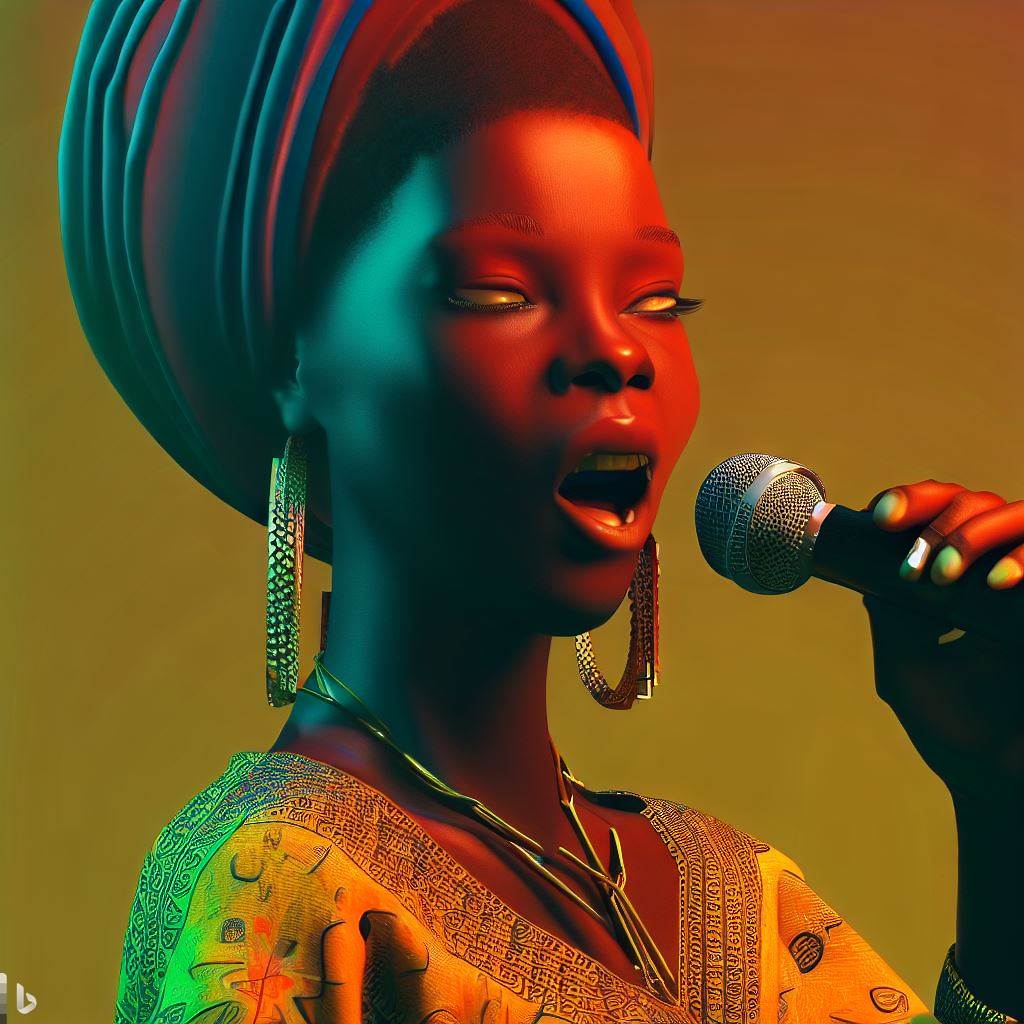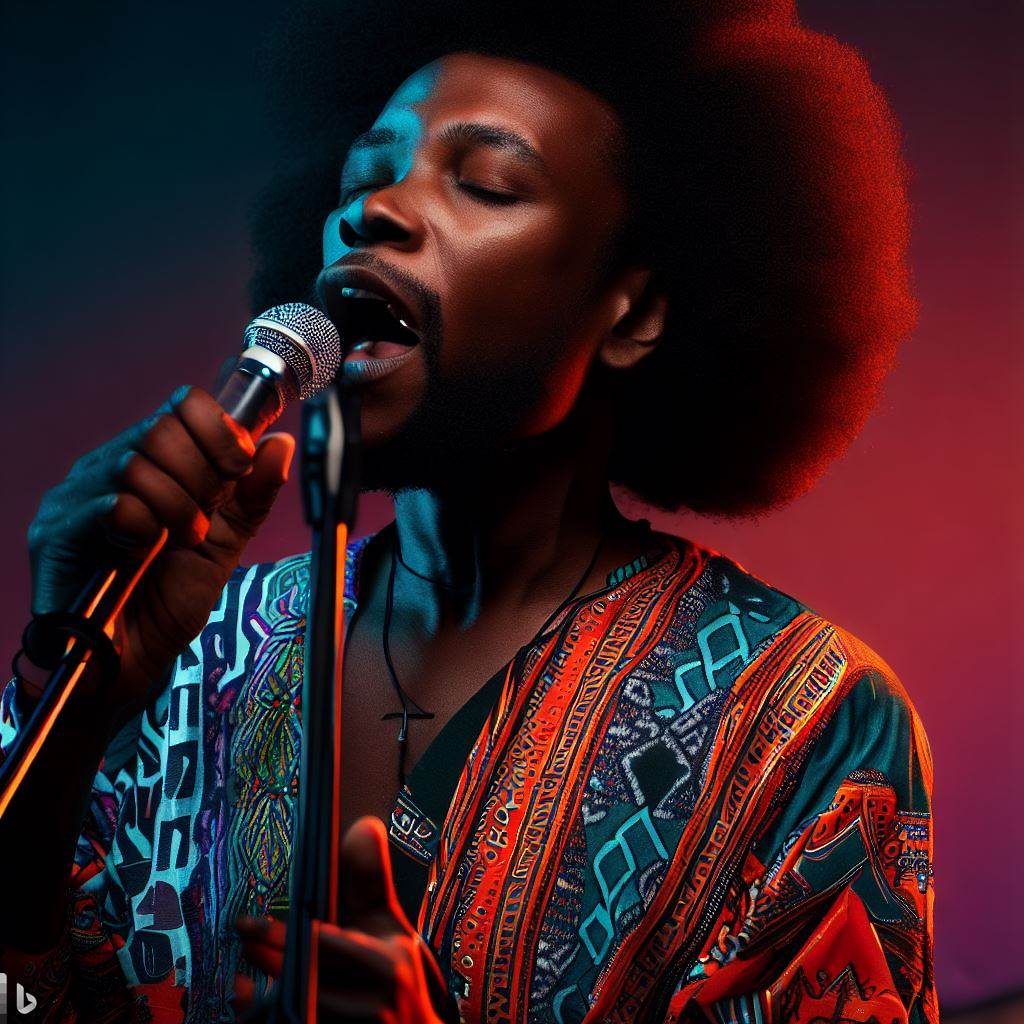Introduction
Nigerian music, encompassing various genres such as Afrobeat, Highlife, and Afropop, has gained immense global popularity.
In recent years, Nigerian artists have dominated international music charts and collaborations, igniting a global interest in the rich and vibrant Nigerian music scene.
This blog post aims to explore the factors contributing to the global impact of Nigerian music and its influence on the music industry worldwide.
The main points discussed in this blog section will include an overview of Nigerian music genres, highlighting their distinct characteristics and evolution over time.
Additionally, we will delve into the global success of Nigerian artists, analyzing the role of social media, streaming platforms, and international collaborations in promoting their music to a wider audience.
Furthermore, we will examine the cultural significance of Nigerian music, exploring how it serves as a medium of expressing diverse narratives, traditions, and values.
Moreover, we will discuss the economic impact of Nigerian music, analyzing its contributions to the country’s GDP and its potential for fostering tourism and cultural exchange.
Lastly, we will touch upon the challenges and future prospects of Nigerian music, considering the impact of piracy, limited infrastructure, and the need for sustained support from the government and private sector.
Ultimately, this blog post aims to provide a comprehensive look at the global impact of Nigerian music, celebrating its achievements while highlighting the opportunities and hurdles that lie ahead.
Historical Background
The origins of Nigerian music
Nigerian music has a rich and diverse history that spans several centuries. Its origins can be traced back to ancient times when indigenous tribes utilized music for various spiritual and social purposes.
Traditional Nigerian music played a significant role in shaping the country’s musical landscape.
In the 1970s, a new genre called Afrobeat emerged, popularized by legendary musician Fela Kuti. Afrobeat combined West African highlife, jazz, funk, and traditional Yoruba music.
Fela Kuti’s politically charged lyrics and infectious rhythms made Afrobeat a powerful tool for social commentary.
Influence of traditional music on contemporary Nigerian music
The influence of traditional music on contemporary Nigerian music cannot be overstated.
Traditional rhythms, instruments, and storytelling techniques continue to inform and inspire modern Nigerian musicians.
Transform Your Career in Nigeria
Discover unmatched expertise with our personalized Career Consulting service. Navigate Nigeria’s job market with a strategy tailored just for you.
Get StartedThe fusion of traditional and modern styles has created a unique sound that resonates both locally and globally.
As technology advanced, the Nigerian music industry underwent further transformation. The introduction of recording studios and the rise of Nigerian pop music, also known as Naija pop, took center stage.
Artists such as King Sunny Ade and Ebenezer Obey pioneered Juju music, while the likes of Fela Kuti and King Sunny Ade heavily influenced the Afrobeat genre.
The transition from traditional to modern styles
Over the years, Nigerian music has experienced a transition from traditional to modern styles. This shift can be attributed to several factors, including colonization, globalization, and technological advancements.
As Nigeria became colonized by the British, Western music began to infiltrate the local music scene.
During this time, Nigerian musicians started experimenting with new instruments and musical styles, blending them with traditional elements.
This fusion resulted in the emergence of highlife music in the 1950s, which quickly gained popularity both within and outside Nigeria.
Highlife music incorporated elements of Western jazz and indigenous rhythms, creating a distinctively Nigerian sound. In recent years, Nigerian music has experienced a global surge in popularity.
Artists like Burna Boy, Wizkid, and Davido have gained international acclaim, collaborating with renowned musicians from around the world.
Their music blends Afrobeat with elements of hip-hop, reggae, and dancehall, creating a sound that transcends borders.
The rise of digital platforms and social media has played a significant role in spreading Nigerian music globally.
Online streaming services and platforms, such as YouTube and Spotify, have made it easier for artists to connect with a global audience.
Nigerian music videos have also become viral sensations, garnering millions of views and showcasing the country’s vibrant culture.
All in all, Nigerian music has a rich historical background that has shaped its global impact today.
Traditional music serves as the foundation, influencing contemporary Nigerian artists in their pursuit of creating a unique sound.
The transition from traditional to modern styles has led to the rise of genres like highlife, Afrobeat, and Naija pop, which continue to captivate audiences worldwide.
With technology bridging geographic barriers, Nigerian music has firmly established itself as a force to be reckoned with on the global stage.
Read: Profiles of Successful Nigerian Performers’ Agents
Rise of Afrobeats
Afrobeats, also known as Afro-pop, is a music genre that originated in Nigeria in the early 2000s.
It fuses traditional African rhythms with contemporary pop and hip-hop elements, creating a vibrant and infectious sound.
Distinctive Elements of Afrobeats
- Infectious Rhythm: Afrobeats is characterized by its infectious rhythm, often driven by energetic percussion and syncopated beats.
- Melodic Hooks: Catchy melodies and hooks are prevalent in Afrobeats, making the music instantly recognizable and appealing to a wide audience.
- Diverse Influences: Afrobeats draws inspiration from various music genres, including highlife, juju, and Afrobeat, as well as Western styles such as hip-hop and R&B.
- Lyricism: Afrobeats songs often feature lyrics in multiple languages, including English, Yoruba, and Pidgin English, reflecting the cultural diversity in Nigeria.
Key Artists and Their Contributions
Several key artists have played a significant role in popularizing Afrobeats globally and establishing it as a mainstream genre:
- Fela Kuti: As the pioneer of Afrobeat music, Fela Kuti’s political and socially conscious lyrics laid the foundation for Afrobeats.
- Wizkid: Wizkid’s breakthrough hit, “Ojuelegba,” brought Afrobeats to the international stage and solidified his status as one of Nigeria’s biggest music exports.
- Davido: Davido’s fusion of Afrobeats with pop and dancehall influences has won him a massive following both in Nigeria and abroad.
- Burna Boy: Burna Boy’s unique style incorporates Afrofusion, reggae, and dancehall, earning him critical acclaim and global recognition.
Collaborations with International Artists
One of the driving forces behind Afrobeats’ global success has been collaborations with international artists:
- Drake: Drake’s collaboration with Wizkid on the hit single “One Dance” introduced Afrobeats to a mainstream Western audience, reaching the top of charts worldwide.
- Beyoncé: Beyoncé’s album “The Lion King: The Gift” featured collaborations with several Afrobeats artists, including Burna Boy, Wizkid, and Tiwa Savage.
- Major Lazer: This electronic music trio has collaborated with numerous Afrobeats artists, infusing their tracks with energetic and infectious beats.
- Ed Sheeran: Ed Sheeran’s collaboration with Fuse ODG and Killbeatz on the track “Boa Me” showcased his willingness to embrace Afrobeats’ vibrant sound.
- International Recognition: Afrobeats is now a staple in major music festivals and global charts.
In fact, Afrobeats’ rise to global prominence can be attributed to its infectious rhythm, melodic hooks, diverse influences, and the contributions of key artists.
Collaborations with international stars have further expanded its reach and brought Afrobeats into the mainstream.
Publish Your Professional Profile, Business or Brand
Showcase your expertise, gain trust, and boost visibility instantly on Professions.ng.
Publish NowWith its distinctive style and growing popularity, Afrobeats continues to shape the global music scene.
Read: Top Skills Needed for Artists’ Agents in Nigeria
Cultural Representation
Nigerian music serves as a reflection of the rich and diverse culture, identity, and societal issues of the country.
It combines traditional elements with modern influences to create a unique sound that represents Nigeria’s cultural vibrancy.
Through the lyrics and melodies, Nigerian musicians address social issues such as poverty, corruption, and inequality.
They use music as a platform to raise awareness and provoke discussions about these pressing problems.
Nigerian music also celebrates the country’s cultural heritage, promoting a sense of pride and unity among its people.
Preserving Nigerian Heritage and Traditions
- Music plays a significant role in preserving Nigerian heritage and traditions.
- Traditional Nigerian music genres like Juju, Highlife, and Afrobeat are passed down through generations.
- Younger artists incorporate these traditional rhythms into their contemporary music, ensuring their continuity.
- By fusing traditional and modern elements, Nigerian musicians attract a wider audience while keeping traditions alive.
- Nigerian music festivals and events provide a platform for showcasing traditional dances, attire, and cultural practices.
Influence on Fashion, Dance, and Language
- Nigerian music has a significant influence on fashion trends, both locally and internationally.
- Artists like Fela Kuti and Burna Boy have not only shaped music but also impacted fashion with their distinctive styles.
- The vibrant and colorful outfits worn by Nigerian musicians in music videos influence fashion choices among fans.
- Nigerian music has popularized dance styles like the Azonto, Shoki, and Zanku, creating global dance crazes.
- In addition to fashion and dance, Nigerian music has influenced the use of language.
- Many Nigerian songs incorporate local dialects and slangs, promoting linguistic diversity and cultural pride.
- The use of Nigerian Pidgin English in music has also gained recognition and acceptance in mainstream media.
Nigerian music’s global impact extends beyond just the entertainment industry. It serves as a powerful medium for cultural representation, preserving heritage, and influencing various aspects of society.
Through their music, Nigerian artists amplify societal issues, celebrate their cultural roots, and shape fashion, dance, and language trends.
The unique blend of traditional and modern elements in Nigerian music showcases the country’s rich diversity and contributes to its global recognition.
Read: The History and Evolution of Music in Nigeria

Find Out More: Skills Needed to Thrive as an Artists’ Manager in Nigeria
Economic Impact
Financial success and revenue generated by Nigerian artists
- Nigerian artists have achieved significant financial success, earning substantial revenue from their music.
- The success of Nigerian artists like Davido, Wizkid, and Burna Boy have brought in millions of dollars in revenue.
- The music industry in Nigeria has experienced exponential growth, contributing significantly to the national economy.
- The Nigerian music industry is now a multi-billion dollar sector, creating jobs and employment opportunities.
- Nigerian artists generate revenue not only through album sales but also from live concerts, endorsements, and streaming platforms.
- The growth of digital music platforms and the increase in music streaming has further boosted revenue for Nigerian artists.
- The success of Nigerian music has attracted foreign investments in the industry, stimulating economic growth.
- The rise of Afrobeats, a genre and sound popularized by Nigerian artists, has increased the export potential of Nigerian music.
- Nigerian artists’ collaborations with international musicians have opened doors for global recognition and increased revenue streams.
Influence on Tourism and Cultural Exchange
- Nigerian music serves as a powerful cultural ambassador, attracting tourists from around the world.
- Local and international tourists visit Nigeria to experience live music performances by popular Nigerian artists.
- Festivals and concerts featuring Nigerian artists have become popular tourist attractions, boosting the tourism industry.
- Nigerian music, with its unique blend of Afrobeat, highlife, and other genres, represents the country’s rich cultural heritage.
- The popularity of Nigerian music has led to an increase in cultural exchange programs and collaborations with international artists.
- Nigerian music acts as a medium to showcase Nigerian culture, traditions, and values to the global audience.
- Nigerian musicians often integrate elements of their ethnic languages and traditional instruments into their music, promoting cultural diversity.
- The increased exposure of Nigerian music on international platforms has led to a better understanding and appreciation of Nigerian culture.
- Nigerian music has also fostered cross-cultural collaborations, strengthening diplomatic ties and enhancing cultural exchange between Nigeria and other countries.
In a nutshell, the economic impact of Nigerian music is profound, contributing to the financial success of artists, stimulating the national economy, and attracting foreign investments.
Additionally, Nigerian music serves as a catalyst for tourism and cultural exchange, showcasing the country’s rich cultural heritage and fostering global connections.
The success of Nigerian artists and the booming music industry have positioned Nigeria as a force to reckon with in the global music scene.
Read: Income Expectations for Performers’ Agents in Nigeria
Uncover the Details: Examining the State of Digital Writing in Nigeria
Social Impact
Fostering Unity and National Pride
- Nigerian music has the power to bring people from different cultural backgrounds together.
- The rhythmic beats and infectious melodies create a shared experience that transcends ethnic divides.
- Artists like Fela Kuti and Burna Boy have used their music to promote national pride and unity.
- Through their lyrics, they celebrate Nigerian culture and inspire a sense of belonging among citizens.
- Music festivals, such as the Lagos Music Festival, also bring people together to celebrate Nigerian music and culture.
- Furthermore, when Nigerian artists collaborate with international musicians, it showcases the unity between nations.
Promoting Social Change and Activism
- Nigerian music has been a powerful tool for addressing social issues and sparking conversations about change.
- Artists like Fela Kuti used their music to criticize political corruption and advocate for human rights.
- Today, artists like Falz and Simi continue this tradition by addressing societal problems through their songs.
- Lyrics that tackle topics like poverty, injustice, and gender equality resonate with listeners, stimulating dialogue and action.
- Moreover, Nigerian music has played a key role in the #EndSARS movement, amplifying the voices of Nigerians demanding police reform.
Influence on the Global Perception of Africa
- Nigerian music has significantly impacted how the world views Africa as a whole.
- Traditionally, Africa has been portrayed through negative stereotypes in the media.
- However, Nigerian music, with its vibrant rhythms and rich cultural expressions, challenges these stereotypes.
- It showcases the diversity, talent, and creativity that exist within the African continent.
- Artists like Wizkid and Davido have gained international recognition, bridging the gap between African and Western music industries.
- Through collaborations with global stars, Nigerian musicians have elevated the perception of African art and culture.
- Nigerian music has become a symbol of African pride, encouraging people to look beyond the stereotypes and appreciate the richness of the continent.
Overall, Nigerian music holds immense power in fostering unity and national pride, promoting social change, and shaping global perceptions of Africa.
Its influence goes beyond entertainment, as it serves as a catalyst for dialogue, activism, and cultural appreciation.
By celebrating their heritage and addressing social issues, Nigerian artists are making a lasting impact on both a local and global scale.
Conclusion
In this blog post, we explored the global impact of Nigerian music and its continued relevance in today’s world.
We discussed how Nigerian artists like Wizkid and Burna Boy have achieved international success and recognition, bringing African music to the global stage.
We highlighted the influence of Nigerian music on various genres like afrobeats, Afro-pop, and Afro-fusion, showcasing its ability to fuse traditional African sounds with contemporary styles.
This blending of diverse musical elements has captivated audiences worldwide, leading to collaborations with renowned artists and producers.
Furthermore, we emphasized the cultural significance of Nigerian music and its power to unite people from different backgrounds and cultures.
Its rhythmic beats and infectious melodies have transcended borders, spreading joy and happiness wherever it is heard.
We encouraged readers to delve deeper into the vibrant Nigerian music scene, exploring the works of emerging artists and discovering the richness of Nigerian culture through its music.
With a plethora of talent and creativity, there is something for everyone to enjoy and appreciate. Nigerian music continues to make waves globally, leaving an indelible mark on the music industry.
Its impact and relevance are undeniable, and as we celebrate the diverse sounds of Nigeria, let us embrace and support this thriving musical landscape.




